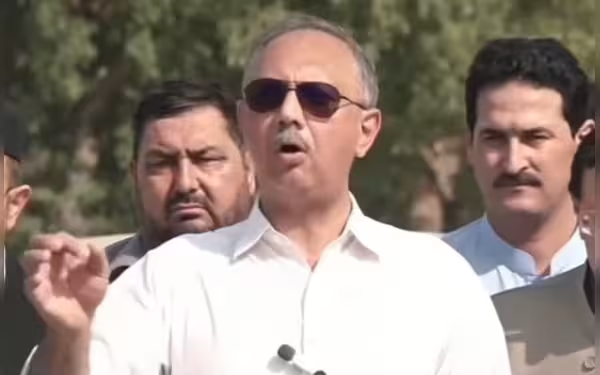Monday, November 25, 2024 11:39 AM
Omar Ayub Calls for Dismissal of Punjab Law Enforcement Officials
- Omar Ayub demands accountability from Punjab law enforcement.
- Allegations of unlawful detentions raise political tensions.
- Call for transparency in police conduct and governance.
 Image Credits: tribune.com.pk
Image Credits: tribune.com.pkOmar Ayub demands the dismissal of key Punjab officials over unlawful detentions, raising concerns about police conduct and political accountability.
In a significant political development, Omar Ayub, a prominent leader of the Pakistan Tehreek-e-Insaf (PTI) party and the opposition leader in the National Assembly, has raised serious concerns regarding the conduct of law enforcement agencies in Punjab. He has demanded the immediate dismissal of the Punjab Inspector General (IG) of Police, the IG of Prisons, and the interior secretary. This call for action comes in the wake of what Ayub describes as unlawful detentions that he and his party members experienced recently.
Omar Ayub's allegations highlight a growing tension between political leaders and law enforcement in Pakistan. He claims that during his detention, police officers acted beyond their authority. "Our vehicles were locked inside, and the police said they had orders to arrest us," Ayub stated, emphasizing the perceived overreach of the police force. Such statements reflect a broader concern among political figures regarding the use of police powers in political matters.
The situation raises important questions about the balance of power between law enforcement and political entities in Pakistan. The role of the police is to maintain law and order, but when their actions are perceived as politically motivated, it can lead to a significant erosion of public trust. Ayub's demands for accountability are not just about his personal experience; they resonate with many citizens who are wary of the potential misuse of power by state authorities.
As the political landscape in Pakistan continues to evolve, the implications of Ayub's demands could be far-reaching. If the government responds to these calls for accountability, it may set a precedent for how law enforcement interacts with political figures in the future. Conversely, failure to address these concerns could lead to increased tensions and further allegations of political oppression.
The situation surrounding Omar Ayub's detention and his subsequent demands for the dismissal of key officials underscores the critical need for transparency and accountability within Pakistan's law enforcement agencies. As citizens, it is essential to remain vigilant and informed about the actions of those in power, ensuring that the rights of individuals are protected and that the rule of law prevails. The ongoing dialogue about these issues will be crucial in shaping the future of governance and civil liberties in Pakistan.













